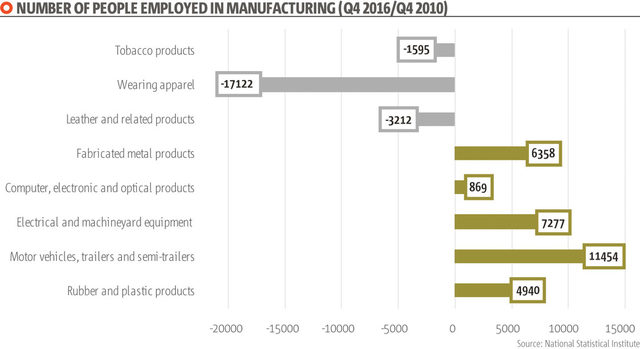Bulgaria's labor market exceeded expectations and outperformed most of its EU peers in terms of both employment gains and decrease in unemployment in the period 2014-2016. As a result, labor shortage in the economy has been increasing and is currently estimated to be about 3 times higher than EU average. This has caused an upward pressure on wages both in manufacturing and services, but a structural shift is also taking place, as a breakdown of employment by economic activities shows.
Manufacturing
In the last two years we've seen the long awaited rebound in manufacturing jobs. Since the labor market bottomed out at 486 thousand employed in 2014, there has been a relatively steady, albeit modest increase to about 508 thousand employed at the end of 2016. However, the significance of the job creation process is not to be found in the number of newly created jobs but rather in their type.

The structure of Bulgaria's manufacturing industry has improved drastically since 2010. While employment in some lower-end economic activities, such as the manufacturing of tobacco products, apparel and leather has continued to shrink rapidly, some higher value added activities have seen significant gains. In the Q4 2010- Q4 2016 period:
· additional 11.4 thousand jobs were created in the manufacturing of motor vehicles, trailers and semi-trailers and parts thereof (103% increase);
· additional 14.5 thousand jobs in the manufacturing of fabricated metal products, computer, electronic and optical products, electrical and machine yard equipment (14% increase);
· additional 4.9 thousand jobs in the manufacturing of rubber and plastic products (22% increase).
Services
The main success story of Bulgaria's labor market in the last years has been the rise in the number of ICT-related jobs. Since Q4 2010 the number of the employed in the broad ICT sector has increased by 27%, thus surpassing the 80 thousand mark for the first time at the end of 2016. A notable fact is that 88% of the overall increases in ICT employment can be attributed to computer programming activities, i.e. the IT sector itself. In the last 6 years the number of people employed in this activity has increased from 25 thousand to over 40 thousand. Significant gains (about 4 thousand jobs, representing an 82% increase in the number of people employed) have also been reported in information service activities such as data processing and web portal management.
On the other hand, the number of people employed in publishing, programming and broadcasting has dropped, while the employment rate in the telecommunications sector has remained flat. Thus, ICT wages have continued to outperform the average wage not simply because of labor shortages, but also due to structural shifts within the broader economic activity. Since freelancing practices are somewhat native to this sector, we can confidently assume that the actual expansion has been even more significant than what the structural business statistics can show.
In conclusion, Bulgaria's manufacturing and service sectors are going through some long overdue inner shifts that can be easily missed if one focuses on the headline labor market indicators alone. The slower recovery or continuing stagnation of some traditional economic activities mask what is a clear and significant upward trend in the quality of the jobs being created.
Bulgaria's labor market exceeded expectations and outperformed most of its EU peers in terms of both employment gains and decrease in unemployment in the period 2014-2016. As a result, labor shortage in the economy has been increasing and is currently estimated to be about 3 times higher than EU average. This has caused an upward pressure on wages both in manufacturing and services, but a structural shift is also taking place, as a breakdown of employment by economic activities shows.












